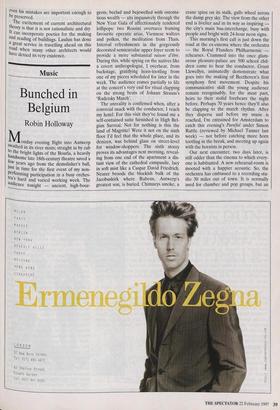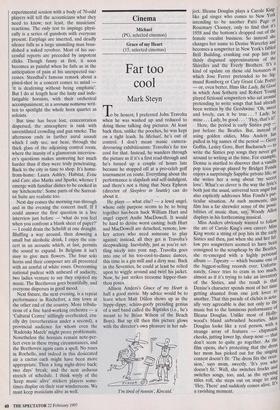Mu sic
Bunched in Belgium
Robin Holloway
Monday evening flight into Antwerp swathed in its river mists; straight in by cab to the bright lights of the Bourla, a heavily handsome late 18th-century theatre saved a few years ago from the demolisher's ball, just in time for the first event of my non- Performing participation in a busy orches- tra's hard and varied working week. The audience tonight — ancient, high-bour- geois, beclad and bejewelled with ostenta- tious wealth — sits impassively through the New Year Gala of affectionately rendered lollipops: two Rossini overtures framing favourite operatic arias, Viennese waltzes and polkas, the meditation from Thais. Interval refreshments in the gorgeously decorated semicircular upper foyer seem to provide a more substantial raison d'être. During this, while spying on the natives like a covert anthropologist, I overhear, from backstage, gratifying horn-tootling from one of my pieces scheduled for later in the week. The audience comes partially to life at the concert's very end for ritual clapping on the strong beats of Johann Strauss's `Radetsky March'.
The unreality is confirmed when, after a convivial snack with the conductor, I reach my hotel. For this visit they've found me a self-contained suite furnished in High Bel- gian Surreal. Not for nothing is this the land of Magritte! Were it not on the sixth floor I'd feel that the whole place, and its denizen, was behind glass on street-level for window-shoppers. The sixth storey proves its advantages next morning, reveal- ing from one end of the apartment a dis- tant view of the cathedral campanile, lacy in soft mist like a Caspar David Friedrich. Nearer broods the blockish bulk of the Jacobuskirk where Rubens, Antwerp's greatest son, is buried. Chimneys smoke, a crane spins on its stalk, gulls wheel across the damp grey sky. The view from the other end is livelier and in its way as inspiring the city's main bus-interchange, busy with people and bright with 24-hour neon signs.
This morning's first call is just down the road at the ex-cinema where the orchestra — the Royal Flanders Philharmonic rehearses. Crammed into the once glam- orous pleasure-palace are 500 school chil- dren come to hear the conductor, Grant Llewellyn, animatedly demonstrate what goes into the making of Beethoven's first symphony first movement. Despite his communicative skill the young audience remain recognisably, for the most part, heirs to their stolid forebears the night before. Perhaps 70 years hence they'll also be clapping to the march rhythm. After they disperse and before my music is reached, I'm entrained for Amsterdam to catch this evening's Parsifal under Simon Rattle (reviewed by Michael Tanner last week) — not before catching more horn tootling in the break, and meeting up again with the hornists in person.
Our next encounter, two days later, is still odder than the cinema to which every- one is habituated. A new rehearsal-room is mooted with a happier acoustic. So, the orchestra has embussed to a recording stu- dio 30 miles out of town. It is normally used for chamber and pop groups, but an
experimental session with a body of 70-odd players will tell the acousticians what they need to know; not least, the musicians' reactions. The only test to impinge physi- cally is a series of gunshots with everyone present. Earplugs are inserted, and deadly silence falls as a large unsmiling man bran- dished a naked revolver. Most of his suc- cessful reports are preceded by impotent clicks. Though funny at first, it soon becomes as painful when he fails as in the anticipation of pain at his unexpected suc- cesses. Stendhal's famous remark about a pistol-shot in a concert comes to mind 'it is deafening without being emphatic'. But I do at length hear the lusty and inde- fatigable hornists, with their orchestral accompaniment, in a serenata nottuma writ- ten to spotlight the whole horn quartet as soloists.
But time has been lost, concentration dispersed, the atmosphere is rank with unventilated crowding and gun smoke. The afternoon ends in further aural assault which I only see, not hear, through the thick glass of the adjoining control room, where the inanity of a glamorous interview- er's questions makes answering her much harder than if they were truly penetrating. Back to the city in time to shop. It's home- from-home: Laura Ashley, Habitat, Evita and Cats; also Marks and Sparks, whence I emerge with familiar dishes to be cooked in my 'kitchenette'. Some parts of the Surreal- ist Suite are realistic too.
Next day comes the morning run-through and in the evening the concert itself. If I could answer the first question in a live interview just before — 'what do you feel when you confront a blank sheet of paper?' — I could drain the Scheldt at one draught. Bluffing a way around, then downing a small but alcoholic drink, I enjoy the con- cert in an acoustic which, at last, permits the sound to expand. In Belgium it isn't sissy to give men flowers. The four solo horns and their composer are all presented with an armful of white roses. Overcoming national pudeur with unheard of audacity, two ladies venture to say they enjoyed my music. The Beethoven goes beautifully, and everyone disperses in good mood.
Next fixture, the next evening, is a repeat performance in Rochefort, a tiny town at the other end of the country. More tribula- tions of a fine hard-working orchestra — a `Cultural Centre' stiflingly overheated, cru- elly dry (reverberation under a second), a provincial audience for whom even the `Radetslcy March' might prove problematic. Nonetheless the hornists remain note-per- fect even in these trying circumstances, and the Beethoven again casts a spell. No roses in Rochelle, and indeed in this desiccated air a cactus each might have been more appropriate. Then a long night-drive back; two days' break; and the next arduous stretch of schedule. I think wryly of the `keep music alive' stickers players some- times display on their rear windscreens. We must keep musicians alive as well.



























































 Previous page
Previous page